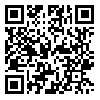Volume 24, Issue 4 (July - August 2025)
Payesh 2025, 24(4): 575-578 |
Back to browse issues page
Download citation:
BibTeX | RIS | EndNote | Medlars | ProCite | Reference Manager | RefWorks
Send citation to:



BibTeX | RIS | EndNote | Medlars | ProCite | Reference Manager | RefWorks
Send citation to:
Mosadeghrad A M. Ethics in health management. Payesh 2025; 24 (4) :575-578
URL: http://payeshjournal.ir/article-1-2378-en.html
URL: http://payeshjournal.ir/article-1-2378-en.html
Department of Health management, policy and economics, School of Public health, Tehran University of Medical Sciences, Tehran, Iran
Abstract: (1375 Views)
Dear Editor,
Management is the process of planning, organizing, leading and controlling the organization's activities and the optimal use of resources to achieve the organization's goals. The manager's performance depends on his talent, personality and effort. Talent includes the manager's intelligence, knowledge and skills. Personality includes the manager's beliefs, values and behaviors. Employees copy their managers’ behaviors. Managers should be a good moral role model for employees by being professional, positive, honest, authentic, conscientious, empathic, creative, and accountable. Adhering to organizational ethics’ principles creates a safe work environment for employees, strengthening trust between employees and managers, promoting the organization’s reputation, and meeting the expectations of employees, customers and managers. The healthcare manager must define organizational values and ethical principles, formulate rules and regulations to adhere to these values and principles, and ensure their implementation in the organization. Formulating organizational ethics charter, establishment of organizational ethics committee, training of employees on organizational ethics and the need to comply with them, and creating a culture of not tolerating organizational immorality, helps to institutionalize ethics in the organization...
Management is the process of planning, organizing, leading and controlling the organization's activities and the optimal use of resources to achieve the organization's goals. The manager's performance depends on his talent, personality and effort. Talent includes the manager's intelligence, knowledge and skills. Personality includes the manager's beliefs, values and behaviors. Employees copy their managers’ behaviors. Managers should be a good moral role model for employees by being professional, positive, honest, authentic, conscientious, empathic, creative, and accountable. Adhering to organizational ethics’ principles creates a safe work environment for employees, strengthening trust between employees and managers, promoting the organization’s reputation, and meeting the expectations of employees, customers and managers. The healthcare manager must define organizational values and ethical principles, formulate rules and regulations to adhere to these values and principles, and ensure their implementation in the organization. Formulating organizational ethics charter, establishment of organizational ethics committee, training of employees on organizational ethics and the need to comply with them, and creating a culture of not tolerating organizational immorality, helps to institutionalize ethics in the organization...
Subject:
Helath Services Management
Received: 2023/12/17 | Accepted: 2023/12/21 | ePublished ahead of print: 2025/07/28 | Published: 2025/09/9
Received: 2023/12/17 | Accepted: 2023/12/21 | ePublished ahead of print: 2025/07/28 | Published: 2025/09/9
References
1. Mosadeghrad AM. Essentials of healthcare organization and management, 1st Edition, Dibagran: Tehran, 2015 [in Persian]
2. Etemadian M, Mosadeghrad AM, Soleimani MJ, Hedayati SP. Leader characteristics in hospital change management: a case study. Hakim Research Journal 2019; 22: 212-29 [in Persian]
3. Dhahabi M. The history of Islam and the deaths of the famous and the most famous.7th Edition. Beirut: Dar Al Kitab Al Arabi, 1989
4. Hakimi M, Hakimi A. Al-Hayat, translated by Ahmed Aram, 2st Edition, Dalil Ma Publication, Iran, 2016 [in Persian]
5. Beyhaqi, A. Sunan Bayhaqi, 10th Edition,University of Islamic Studies: Pakistan, 1989
6. Tamimi, A. Ghorar al-Hikam and Dharar al-Kalam. 1th Edition, Dar al-Hadith Cultural Institute, 2016
7. Mosadeghrad A M, Parsaeian M, Hedayati P. Organizational culture of hospitals affiliated to Tehran University of Medical Sciences. Payesh 2023; 22:375-385 [in Persian] [DOI:10.61186/payesh.22.4.375]
8. Liddell HG, Scott R. An intermediate Greek-English lexicon. 1th Edition, Martino Fine Books: USA, 2013
9. McLeod MS, Payne GT, Evert RE. Organizational ethics research: A systematic review of methods and analytical techniques. Journal of Business Ethics 2016;134:429-43 [DOI:10.1007/s10551-014-2436-9]
10. Mosadeghrad AM. Healthcare Managers' Code of Ethics. Iranian Journal of Medical Ethics and History of Medicine 2023;16:1-5 [in Persian] [DOI:10.18502/ijme.v16i11.15947]
Send email to the article author
| Rights and Permissions | |
 |
This work is licensed under a Creative Commons Attribution-NonCommercial 4.0 International License. |






